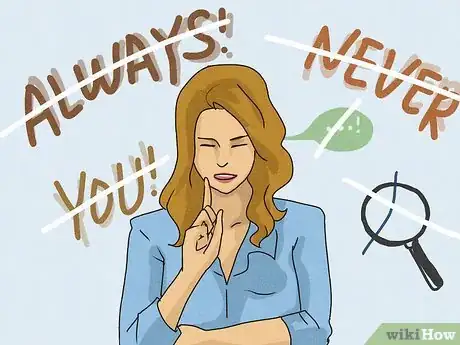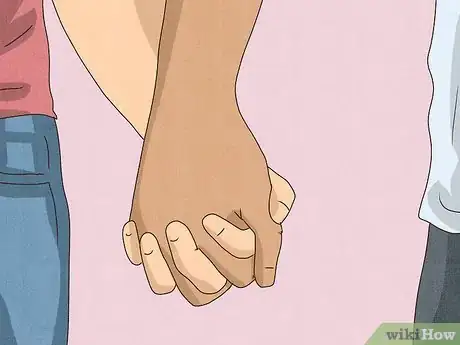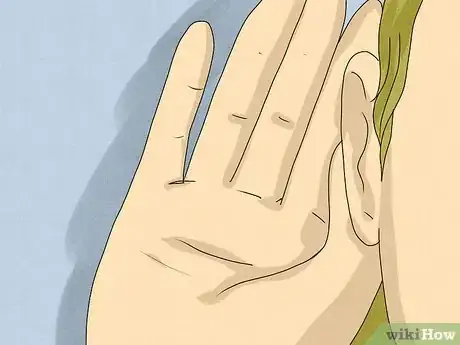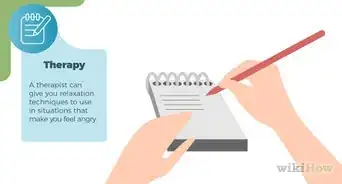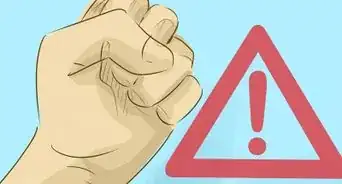This article was co-authored by Chloe Carmichael, PhD and by wikiHow staff writer, Hannah Madden. Chloe Carmichael, PhD is a Licensed Clinical Psychologist who runs a private practice in New York City. With over a decade of psychological consulting experience, Dr. Chloe specializes in relationship issues, stress management, self esteem, and career coaching. She has also instructed undergraduate courses at Long Island University and has served as adjunct faculty at the City University of New York. Dr. Chloe completed her PhD in Clinical Psychology at Long Island University in Brooklyn, New York and her clinical training at Lenox Hill Hospital and Kings County Hospital. She is accredited by the American Psychological Association and is the author of “Nervous Energy: Harness the Power of Your Anxiety” and “Dr. Chloe's 10 Commandments of Dating.”
There are 12 references cited in this article, which can be found at the bottom of the page.
This article has been viewed 94,791 times.
Are you having a tough time controlling your temper? Every relationship has its ups and downs, but anger in a relationship can really take its toll. If you feel like you always look for the negatives in your partner, you might be dealing with some anger issues. Fortunately, there are ways you can combat your anger and work together with your partner for the sake of your relationship. Read through these tips to control your emotions and resolve conflicts without blowing up.
Steps
Expert Q&A
Did you know you can get premium answers for this article?
Unlock premium answers by supporting wikiHow
-
QuestionWhat causes anger in a relationship?
 Chloe Carmichael, PhDChloe Carmichael, PhD is a Licensed Clinical Psychologist who runs a private practice in New York City. With over a decade of psychological consulting experience, Dr. Chloe specializes in relationship issues, stress management, self esteem, and career coaching. She has also instructed undergraduate courses at Long Island University and has served as adjunct faculty at the City University of New York. Dr. Chloe completed her PhD in Clinical Psychology at Long Island University in Brooklyn, New York and her clinical training at Lenox Hill Hospital and Kings County Hospital. She is accredited by the American Psychological Association and is the author of “Nervous Energy: Harness the Power of Your Anxiety” and “Dr. Chloe's 10 Commandments of Dating.”
Chloe Carmichael, PhDChloe Carmichael, PhD is a Licensed Clinical Psychologist who runs a private practice in New York City. With over a decade of psychological consulting experience, Dr. Chloe specializes in relationship issues, stress management, self esteem, and career coaching. She has also instructed undergraduate courses at Long Island University and has served as adjunct faculty at the City University of New York. Dr. Chloe completed her PhD in Clinical Psychology at Long Island University in Brooklyn, New York and her clinical training at Lenox Hill Hospital and Kings County Hospital. She is accredited by the American Psychological Association and is the author of “Nervous Energy: Harness the Power of Your Anxiety” and “Dr. Chloe's 10 Commandments of Dating.”
Licensed Clinical Psychologist
-
QuestionHow can I stop myself when I want to yell at my partner?
 Chloe Carmichael, PhDChloe Carmichael, PhD is a Licensed Clinical Psychologist who runs a private practice in New York City. With over a decade of psychological consulting experience, Dr. Chloe specializes in relationship issues, stress management, self esteem, and career coaching. She has also instructed undergraduate courses at Long Island University and has served as adjunct faculty at the City University of New York. Dr. Chloe completed her PhD in Clinical Psychology at Long Island University in Brooklyn, New York and her clinical training at Lenox Hill Hospital and Kings County Hospital. She is accredited by the American Psychological Association and is the author of “Nervous Energy: Harness the Power of Your Anxiety” and “Dr. Chloe's 10 Commandments of Dating.”
Chloe Carmichael, PhDChloe Carmichael, PhD is a Licensed Clinical Psychologist who runs a private practice in New York City. With over a decade of psychological consulting experience, Dr. Chloe specializes in relationship issues, stress management, self esteem, and career coaching. She has also instructed undergraduate courses at Long Island University and has served as adjunct faculty at the City University of New York. Dr. Chloe completed her PhD in Clinical Psychology at Long Island University in Brooklyn, New York and her clinical training at Lenox Hill Hospital and Kings County Hospital. She is accredited by the American Psychological Association and is the author of “Nervous Energy: Harness the Power of Your Anxiety” and “Dr. Chloe's 10 Commandments of Dating.”
Licensed Clinical Psychologist
References
- ↑ https://www.mayoclinichealthsystem.org/hometown-health/speaking-of-health/7-anger-management-tips-to-prevent-relationship-damage
- ↑ https://www.helpguide.org/articles/relationships-communication/anger-management.htm
- ↑ https://www.mondaycampaigns.org/destress-monday/deep-breathing-heart-health
- ↑ https://www.mayoclinichealthsystem.org/hometown-health/speaking-of-health/7-anger-management-tips-to-prevent-relationship-damage
- ↑ https://www.helpguide.org/articles/relationships-communication/anger-management.htm
- ↑ http://www.apa.org/topics/anger/control.aspx
- ↑ https://raisingchildren.net.au/guides/first-1000-days/looking-after-yourself/anger-management-for-parents
- ↑ https://www.helpguide.org/articles/relationships-communication/anger-management.htm
- ↑ https://www.uofmhealth.org/health-library/uf9897
- ↑ https://ohioline.osu.edu/factsheet/HYG-5191
- ↑ https://www.marriage.com/advice/relationship/using-i-statements-in-relationships/
- ↑ https://www.psychologytoday.com/us/blog/between-you-and-me/201706/why-and-how-be-better-listener-in-your-relationship
- ↑ https://www.betterhealth.vic.gov.au/health/HealthyLiving/relationships-and-communication#managing-conflict-with-communication
- ↑ https://www.psychologytoday.com/us/blog/so-happy-together/201611/forgiving-your-partner
- ↑ https://www.apa.org/topics/anger/control
About This Article
If you are in a relationship and want to control your anger during a fight, try to give yourself time to think before you speak, so you can express yourself calmly and clearly. To calm both your body and mind, take deep breaths and repeat a calming phrase, like "relax" or "I am calm," which will remind you to keep your composure. When you express your thoughts to your partner, make sure to use "I" statements instead of "you" statements, like "I feel really angry when you say things like that." That way, your partner won't feel like you are blaming them for your emotions. However, if things escalate too much, call a timeout by explaining that you need a second to regain your composure, but still want to talk later. For more advice from our co-author, like how to avoid further conflict, read on.






